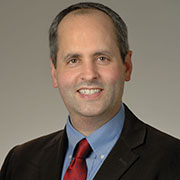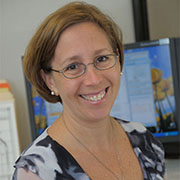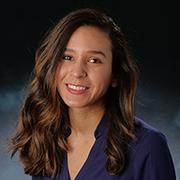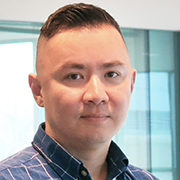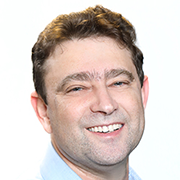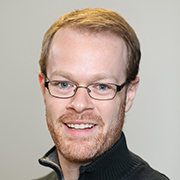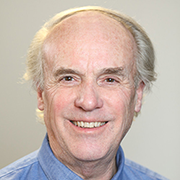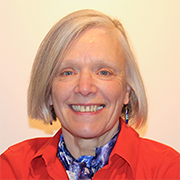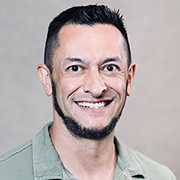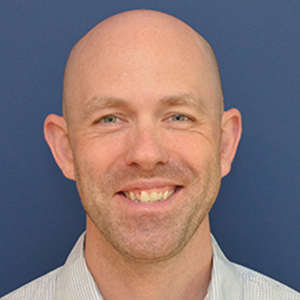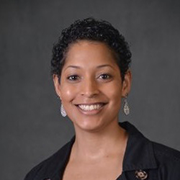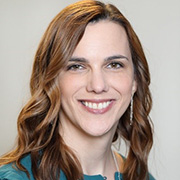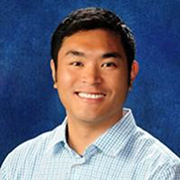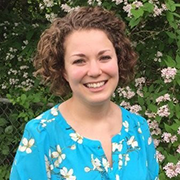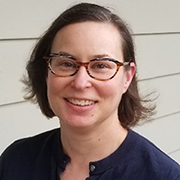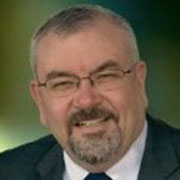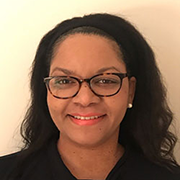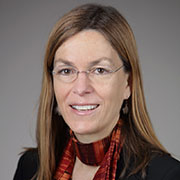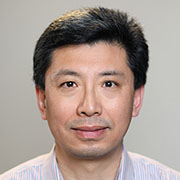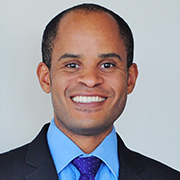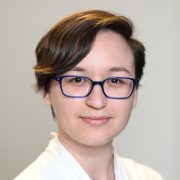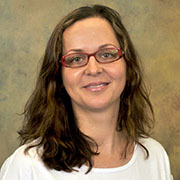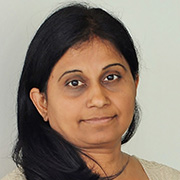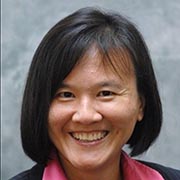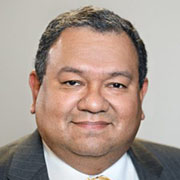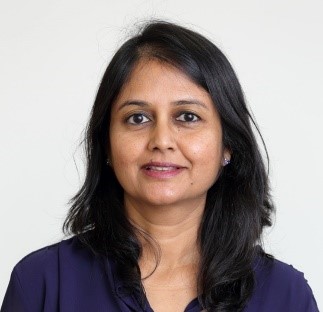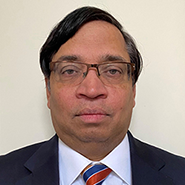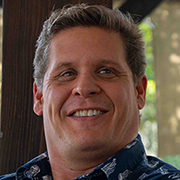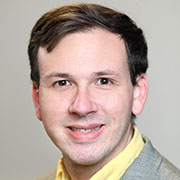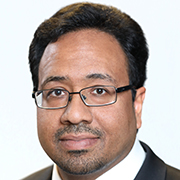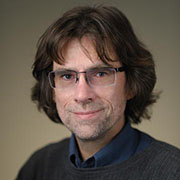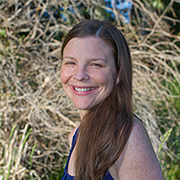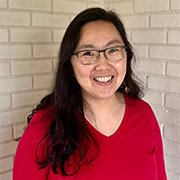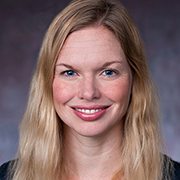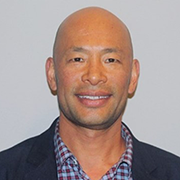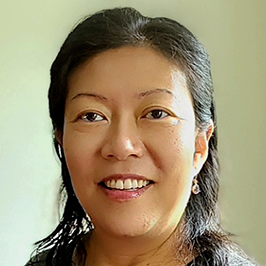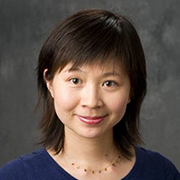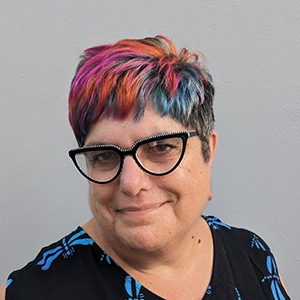Current Contributors
As NIGMS director, Jon oversees the Institute’s research, training, and other programs. He’s committed to engaging the scientific community on a wide range of topics, including funding policies and trends, research evaluation, and workforce development.
A cell biologist, Alexandra manages grants in the areas of chromosome and nuclear structures, motor proteins, cytoskeletal filaments, and intracellular transport.
Lameese, who trained in integrative physiology, is a program director in the Division of Training and Workforce Development. She manages Maximizing Access to Research Careers, Postbaccalaureate Research Education Program, and Innovative Programs to Enhance Research Training grants.
Charles is a biochemist who manages grants in the areas of bioenergetics, redox reactions, and trace metal homeostasis. He is a scientific contact for the NIGMS Academic Research Enhancement Awards (AREA) R15 program and is chair of the NIH R15 Program Advisory Committee.
As director of the NIGMS Division of Data Integration, Modeling, and Analytics, Richard advises on the Institute’s strategic planning activities, analyzes and evaluates its research and training programs, and serves as its legislative liaison.
Susan is the team lead for public information and outreach. She manages a number of social media and electronic outreach products, including the Feedback Loop blog.
Ashley is a program director in the Division of Biophysics, Biomedical Technology, and Computational Biosciences, where he oversees grants focused on technology development in cell and organelle manipulation, mechanobiology, structural biology, and bioanalytical chemistry. His scientific background is in biochemistry, physical chemistry, bioanalytical instrumentation, and structural biology. He is a scientific contact for the Biomedical Technology Optimization and Dissemination (BTOD) Centers (RM1) Program.
Oleg is a biochemist who manages grants in the area of enzymology and metabolism. He also manages individual postdoctoral fellowships and career development awards and serves as scientific/research contact for the Collaborative Program Grant for Multidisciplinary Teams (RM1) for the Division of Pharmacology, Physiology, and Biological Chemistry.
Jake, who trained in biostatistics and cardiovascular genetics, is a statistical policy analyst in the NIGMS Division of Data Integration, Modeling, and Analytics. He uses a diverse suite of data science tools to study the Institute’s research portfolios, training programs, and funding policies.
Tony is a program director in the Division for Research Capacity Building, where he oversees the Science Education Partnership Award (SEPA) program, which supports educational activities which complement or enhance workforce training to meet the nation’s biomedical, behavioral, and clinical research needs. He also manages the SBIR/STTR STEM Interactive Digital Media program.
Dorothy, a molecular biophysicist, is director of the NIGMS Division of Biophysics, Biomedical Technology, and Computational Biosciences. She works with the scientific community to advance BBCB’s mission to support research in biophysics, biotechnology, and computational biology.
Fed is the chief of the Research Advancements Programs Branch in the Division for Research Capacity Building. He oversees the Centers of Biomedical Research Excellence and Support for Research Excellence programs. His scientific background is in synthetic organic chemistry and chemical biology.
Greg is the chief of the Scientific Review Branch, where he oversees the peer review-related activities for applications assigned to NIGMS.
As a physiologist and former professor at a primarily undergraduate institution, Sydella administers programs that include institutional training awards, research on interventions, and improving sponsored programs capacity.
Anissa manages grants in the Postdoctoral, Early Career, and Workforce Development Branch of the Division of Training and Workforce Development (TWD). She rejoined TWD after serving for two years as chief of the Research Training and Career Development Branch at the National Institute of Dental and Craniofacial Research.
As director of the Division of Extramural Activities, Erica oversees the peer review and fiscal management of NIGMS grants and advises staff on the planning, development, and administration of Institute grant programs.
Jason is a scientific review officer in the NIGMS Scientific Review Branch. He reviews a wide range of applications for research capacity building and other grant mechanisms in the areas of biochemistry, cell and developmental biology, neuroscience, and physiology.
Rachel is a science writer who enjoys using her medicinal chemistry training to create accessible public health content and engaging science education resources.
Pauline oversees the Support for Research Excellence (SuRE) First Independent Research (SuRE-First) Award program and manages grants for the Centers of Biomedical Research Excellence (COBRE) and the IDeA Clinical & Translational Research Development (CTR-D) Award programs.
Shannon is a health science policy analyst in the Division of Extramural Activities. She facilitates the development and publication of NIGMS funding opportunities; acts as project lead on collaborations to address NIGMS business process needs; and assists in the Institute’s receipt and referral process, including coordinating with other parts of NIH.
Miles manages research grants and postdoctoral fellowships in the areas of bioorganic and medicinal chemistry.
As chief of the Biophysics Branch, Paula oversees research and training programs that apply techniques and principles derived from the physical sciences to examine structures and structure-function relationships in biology. Her training was in structural biology and she was an early adopter of cryo-electron microscopy.
Shawn is director of the Division of Genetics and Molecular, Cellular, and Developmental Biology. A molecular biologist, she manages grants in the areas of chromosome and nuclear structures, along with organismal response to environmental stressors.
Alison is a senior advisor in the Division of Training and Workforce Development, which supports a variety of research training and career development programs at the undergraduate through faculty levels. She is also acting chief of the Cross-Disciplinary Pathways Programs Branch.
Hongwei’s scientific expertise is focused on pathoimmunology. He manages multicomponent grants supported through the Institutional Development Award (IDeA) program.
A biophysicist, Anne manages grants in the areas of molecular modeling, theory, and design including macromolecular structure prediction, protein folding, ligand binding, and drug design. She is also a scientific contact for the NIGMS Academic Research Enhancement Awards (AREA) R15 program.
Kenny is director of the Division of Training and Workforce Development, which supports programs that foster the training and development of a strong biomedical workforce through a variety of programs at the undergraduate, graduate, postdoctoral, faculty, and institutional levels.
Kalynda manages grants in the Division of Training and Workforce Development (MOSAIC, MARC, IPERT, TURTLE, and training modules), and a portfolio in the areas of endocytosis, lysosomes, and related organelles in the Division of Genetics and Molecular, Cellular, and Developmental Biology.
Clau is responsible for developing and executing human resource strategy in support of NIGMS’ strategic priorities. She focuses in the areas of succession planning, change management, and organizational and performance management.
Marie, who trained in chemistry and biotechnology, is a program director in the Division of Training and Workforce Development. She manages grants in the Undergraduate Research Training Initiative for Student Enhancement (U-RISE), Innovative Programs to Enhance Research Training (IPERT), and predoctoral institutional research training grants in Cellular, Biochemical, and Molecular Sciences (T32).
Zuzana is a pharmacologist by training and manages a portfolio of research and training grants in anesthesiology and perioperative pain. She also previously managed awards supported through the Institutional Development Award (IDeA) program.
A biochemist with previous biotech industry experience, Sailaja administers research grants in the areas of receptors, drug targets, and signal transduction; training grants in pharmacological sciences; and serves as a program contact for the Maximizing Investigators’ Research Award for early stage investigators.
Olga is a biophysicist and molecular physiologist by training. She manages multicomponent grants supported through the Institutional Development Award (IDeA) program.
Christy is a grants management team leader in the Grants Administration Branch. She manages grant programs supported by the Division for Research Capacity Building.
Sally leads the division responsible for the full-range of administrative management functions at NIGMS including acquisitions, information technology, financial management, management analysis, human resources, communications, and ethics.
Rochelle directs the NIGMS division that funds a broad range of research from basic studies in synthetic chemistry, enzymology, biotechnology, chemical biology, and glycosciences to clinical areas that include pharmacology, anesthesia, sepsis, traumatic injury, and wound healing. She is a pharmacologist who has played leading roles in fostering research in pharmacogenomics through national and international collaborations.
As chief of the Information Resources Management Branch, Jose leads a team that oversees all areas of the Institute’s information technology needs, including the NIGMS website. His office develops custom mission critical systems, supports the Institute IT infrastructure, and provides the Institute with cutting edge technologies.
Baishali is a molecular biologist who manages grants in the area of cell death, autophagy, and homeostasis, as well as membrane biology and organelle biogenesis. She also comanages the U-RISE program.
Lakshmi is trained in bioinformatics and leads data science activities including cloud computing, artificial intelligence, and machine learning. He also manages multicomponent grants supported through the Institutional Development Award (IDeA) and Native American Research Centers for Health (NARCH) programs.
Jeremy is a neurobiologist and program director in the Division of Training and Workforce Development. He manages grants for the IMSD, G-RISE, and Bridges to the Doctorate programs along with F31 fellowships.
Andrew, who trained in biochemistry and biophysics, is a branch chief in the Division of Data Integration, Modeling, and Analytics. He oversees analysis and evaluation of NIGMS programs and processes, as well as creation of tools to provide Institute staff with the data needed to make informed decisions.
Nathan, who was trained in high energy physics, is a data scientist in the NIGMS Division of Data Integration, Modeling, and Analytics. He uses numerous mathematical and computer science techniques to study the Institute’s research portfolios, training programs, and funding policies.
As chief of the financial management branch, Tony leads a team that has fiscal oversight for all facets of the Institute’s appropriation. His office develops financial management plans, formulates budgets, and coordinates Congressional budget justifications.
Han is a chemical engineer who manages grants in the areas of computational chemistry and biology in the Division of Biophysics, Biomedical Technology, and Computational Biosciences. He is a scientific contact for the NIGMS National and Regional Resources (R24) Program.
Nie manages grants in the area of ion channels, GAP junctions, structural membrane lipids, integral membrane proteins, and calcium signaling. He also manages predoctoral training grants in the area of systems and integrative biology.
As the communications director for NIGMS, Stephanie oversees the Institute’s outreach to the general public, the biomedical research community, and other audiences. Her office communicates the goals and progress of NIGMS-supported research, training programs, and activities.
Jim, who previously worked at NIGMS, directs NIH’s Office of Data Analysis Tools and Systems. In addition to managing the development and maintenance of NIH’s Research Portfolio Online Reporting Tools, including RePORTER, he analyzes and presents data on NIH research programs and research personnel for use in program evaluation and policy studies.
Mike manages research grants on DNA replication, organismal response to the environment, and microbe-host interactions.
Crystal trained as a microbiologist and is the Native American Research Centers for Health (NARCH) program director. She also manages IDeA Networks of Biomedical Research Excellence (INBRE), Institutional Development Award Networks for Clinical and Translational Research (IDeA-CTR), and Support for Research Excellence (SuRE, and SuRE-First) grants.
Mercedes is director of the Division for Research Capacity Building. She oversees the Institutional Development Award (IDeA), Native American Research Centers for Health (NARCH), Science Education Partnerships Awards (SEPA), and Support for Research Excellence (SuRE) programs.
Michael manages research grants in the biophysical studies of the viral life-cycle and in biophysical studies of nucleic acids and nucleoprotein complexes.
Sangita, a structural biologist, is a program director in the Division of Biophysics, Biomedical Technology, and Computational Biosciences. She manages grants in the areas of bioanalytical technologies and structural biology and is a scientific contact for the NIGMS National and Regional Resources (R24) Program.
Joyce is a developmental biologist and a former professor at a primarily undergraduate institution. She manages undergraduate and predoctoral training and fellowship programs in the Division of Training and Workforce Development.
Laurie is a neuroscientist and former teaching faculty member who administers training and research education programs at the undergraduate and predoctoral levels. She also manages research grants in the area of membrane biology and organelle biogenesis.
Jianhua, a cell biologist, is chief of the Developmental and Cellular Processes Branch in GMCDB. He manages research grants in cell organization, mechanics, migration, and adhesion.
Jiong is a program director in the Division of Pharmacology, Physiology, and Biological Chemistry, where he oversees grants in the area of synthetic chemistry. His scientific background is in synthetic organic chemistry and chemical biology.
Alvin is a program officer in the Division of Biophysics, Biomedical Technology, and Computational Biosciences. In his position, he oversees NIGMS grants for technology development and biomedical technology development and dissemination. The technology development grants under his management include microscopy and imaging (e.g., probes, reporters, hardware, and methods) and cell investigation and manipulation (e.g., DNA and RNA manipulation).
Jean, who trained in computational biology and computer science, is the chief of the Bioinformatics and Computational Biology Branch. She oversees research and training programs that join computer science, engineering, mathematics, biostatistics, data science, and biophysics with biomedical science.
Formerly a physiologist and professor in academia, Xiaoli is a program director in the Division of Pharmacology, Physiology, and Biological Chemistry. She administers research grant programs in sepsis and septic shock, injury and critical illness, inflammation and innate immunity, as well as institutional postdoctoral training grants in injury and critical care.
Yang is a program director in the Division for Research Capacity Building. She manages multicomponent grants supported through the Institutional Development Award (IDeA) program.
Dorit is the deputy director of NIGMS. In this position, she provides leadership on the full range of NIGMS activities supporting basic research that increases understanding of foundational biological processes and drives advances in human health.


